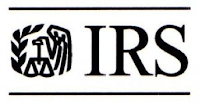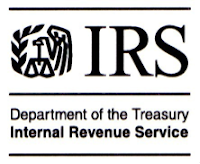Phishing is not a leisure activity where you spend an afternoon on the lake with friends and family.
On January 24, 2012 we published an article here titled "Phishing Scams," which has since drawn a lot of attention. Also, the IRS recently published a tax tip titled “Don’t Be Scammed by Cyber Criminals,” which goes to show you how big of a problem “phishing” and other identity theft methods have become. The notice confirmed the fact that the IRS doesn’t use email as a regular mode of communication to deliver notices of deficiency, request for additional information, etc. The IRS prefers to correspond with taxpayers in written form.
Some scammers have used the IRS logo in a fraudulent manner, hoping to trick their intended victims into thinking they’ve received legitimate correspondence. Official IRS logos look like this:

Here are five things the IRS wants you to know about phishing scams:
1. The IRS never asks for detailed information like PIN numbers, passwords or similar secret access information for credit card, bank or other financial information.
2. The IRS does not initiate contact with taxpayers by email to request personal or financial information. If you receive an email claiming to be from the IRS or directing you to an IRS site, you should not:
- Reply to the message.
- Open any attachments. Attachments may contain malicious code that will infect your computer.
- Click on any links. If you have done this and entered confidential information, visit the IRS website and enter the search term ‘identity theft’ for more information and resources to help.
If you receive a phone call, fax, or letter in the mail from an individual claiming to be from the IRS but you suspect they are not an IRS employee, contact the IRS at 1-800-829-1040 to determine if the IRS has a legitimate need to contact you. Report any bogus correspondence. You can forward a suspicious email to [email protected].
You can help shut down these schemes and prevent others from being victimized. Details on how to report specific types of scams and what to do if you’ve been victimized are available at www.irs.gov. Click on “phishing” on the home page.
Of course, the best thing you can do is be vigilant about this so that you don’t become a victim in the first place. There’s nothing more important than safeguarding your financial well-being and personal identity. Check out this IRS webpage for further information on this very important topic:
http://www.irs.gov/privacy/article/0,,id=179820,00.html
-By Marvin Rotenberg and Jared Trexler






 Articles That Move
Articles That Move







0 comments:
Post a Comment